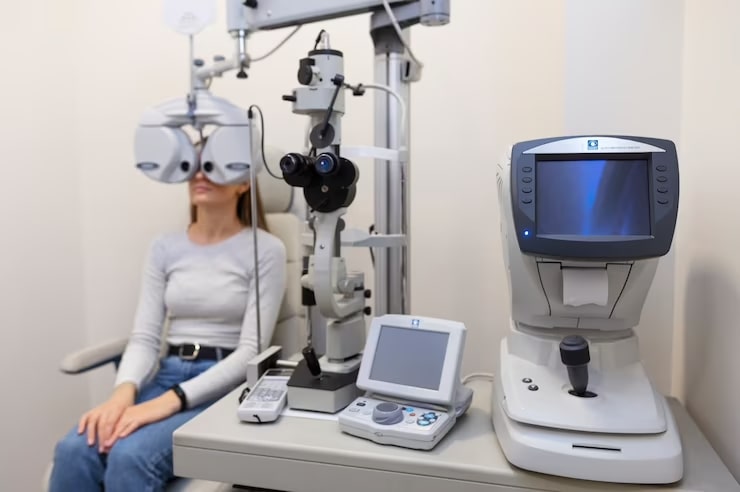Preventive Healthcare
Uveitis: What It Is? Causes, Symptoms, and Treatment

Table of Contents
What is Uveitis?
Uveitis is an umbrella term that involves a range of conditions that affects the uvea — the middle layer of your eye. It causes inflammation, redness, and pain in the eyes. If left untreated, uveitis can lead to permanent loss of vision (blindness). If diagnosed early, uveitis treatment can help.
Uveitis is a group of ailments that damage critical blood vessels and tissues that nourish your eye. You may develop this condition in one or both eyes.
The causes of uveitis include infection (viral or bacterial), injury, or any underlying autoimmune health condition you may have.
Although people between 20 and 60 are the most affected, it can occur at any age.
What Are The Types of Uveitis?
Depending on the affected part of the uvea, there are four forms of uveitis. These include the following:
- Anterior Uveitis: It is also called iritis. It impacts the anterior or front part of your eye and is among the most commonly-occurring uveitis.
- Intermediate Uveitis: As the name suggests, intermediate uveitis affects the middle part of your eye. It is called vitreous when intermediate uveitis causes inflammation of the eye's vitreous cavity (a jelly-like part). And when intermediate uveitis occurs with no underlying reason, it is called pars planitis.
- Posterior Uveitis: Posterior means backside. So, when the back of your eye is affected, it is known as posterior uveitis. It happens due to swelling of the choroid and retina.
- Panuveitis: When all the layers of your uvea are inflamed, it is called panuveitis.
What Are The Symptoms of Uveitis?
Uveitis symptoms are likely to vary from person to person. In most cases, they occur all of a sudden. However, they can also develop gradually. Some of the telltale signs of uveitis include the following:
- The appearance of eye floaters (these are spots that appear in the field of your vision)
- Redness in the eye
- Pain in the eye
- Cloudy or blurred vision
- Headache
- Sensitivity to light or photophobia
When to See a Doctor?
If you develop the symptoms of uveitis, including unexpected vision issues or severe eye pain, get in touch with your doctor immediately. Your doctor may recommend visiting an ophthalmologist (eye specialist). Make sure not to delay visiting a doctor, as it can lead to severe eye-related problems.
What Are The Causes of Uveitis?
In one of three instances, the exact cause of uveitis is unknown. However, the following scenarios increase your risk of developing this condition:
- Lifestyle choices like smoking
- Injury to the eyes
- Infections such as syphilis, AIDS and HIV, shingles, Lyme disease, herpes simplex, leptospirosis, TB
- Autoimmune health conditions, including psoriasis, ulcerative colitis, rheumatoid arthritis, arthritis, ankylosing spondylitis, Crohn's disease, multiple sclerosis, Vogt-Koyanagi-Harada disease
Other risk factors may include:
- Pregnancy
- Low vitamin D levels
- Certain medications
- Autoimmune conditions
- Gender (women are more susceptible to this condition than men)
What Are The Possible Complications of Uveitis?
If ignored or left untreated, uveitis can lead to the following complications:
- Retinal scarring
- Swelling of the retina or retinal oedema
- Glaucoma
- Retinal detachment
- Cataract
- Damage to the optic nerve
- Permanent loss of vision
How is Uveitis Diagnosed?
On visiting your ophthalmologist, they will ask for your medical history and perform a thorough eye examination. The tests are likely to include the following:
- Reading chart or visual acuity test to diagnose vision loss, if any
- Tonometry or ocular pressure test to measure the pressure of your eyes
- Slit-lamp test to probe the inner areas of your eyes
- Ophthalmoscopy or dilated eye exam using a specialised lens to examine the posterior part of your eyes
Your doctor may also recommend the following:
- Blood examinations to rule out the possibility of infections or other health conditions
- Brain or chest imaging to examine systemic inflammatory causes
- Gonioscopy to test the front part of your eyes
- Fluorescein angiography to take pictures of your eye's blood vessels
- Optical coherence tomography (OCT)
- Optical coherence tomography angiography (OCTA)
How is Uveitis Treated?
If any underlying medical condition causes uveitis, your uveitis treatment plan will focus on that condition. The main objective of the treatment is to work on the symptoms and reduce them. Based on the type of uveitis you have, your doctor may recommend the following treatments:
Medications
- Anti-inflammatory drugs: Your doctor will likely prescribe anti-inflammatory eye drops, such as corticosteroids, to counter swelling. In some cases, eye drops are not enough. The doctor may suggest getting corticosteroids in injection or tablet form.
- Antispasmodics: To minimise eye pain, your doctor may suggest an antispasmodic drug. These drops dilate or widen your pupil to control spasms.
- Antibacterial or Antiviral Medications: If your uveitis is due to an infection, your doctor will prescribe antiviral medicines or antibiotics to fight the cause and subside the infection.
- Immunosuppressive Medications: If corticosteroids do not work well, if you are on the verge of blindness, or if both eyes are affected, you may have to take immunosuppressive drugs for your uveitis treatment.
Surgery
If medications do not relieve your symptoms, your doctor may suggest surgery. Vitrectomy is a surgical procedure in which a part of the vitreous in your eye is removed. However, it is rarely used.
Implant
In some people, posterior uveitis is hard to treat. For them, the doctors use a device, a medication-releasing implant. It slowly releases the medicine, corticosteroid, into your eyes. It is administered in your eyes for a certain period of time.
Get help now
If you experience any of the uveitis symptoms, do not ignore them and seek medical assistance without fail.




























